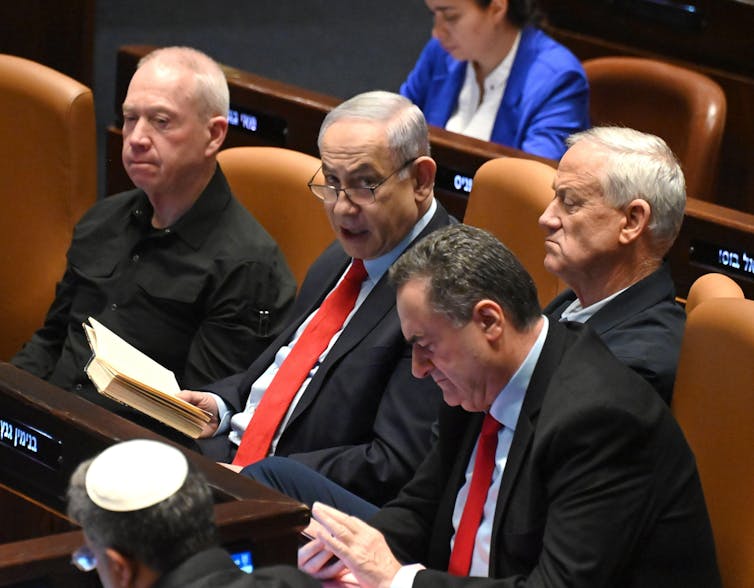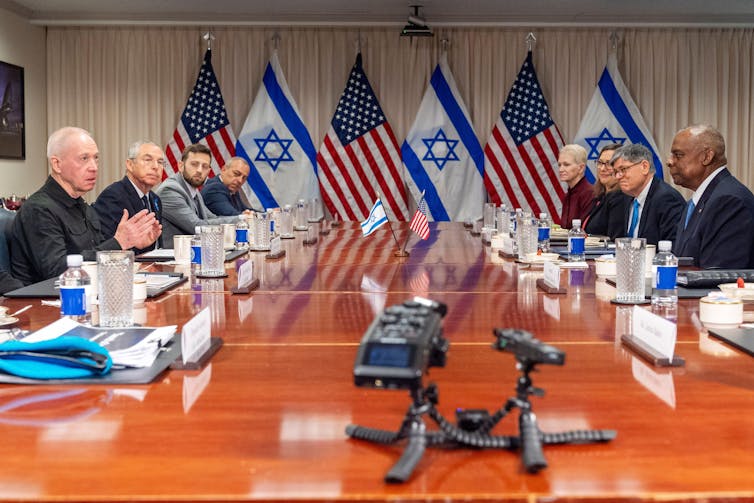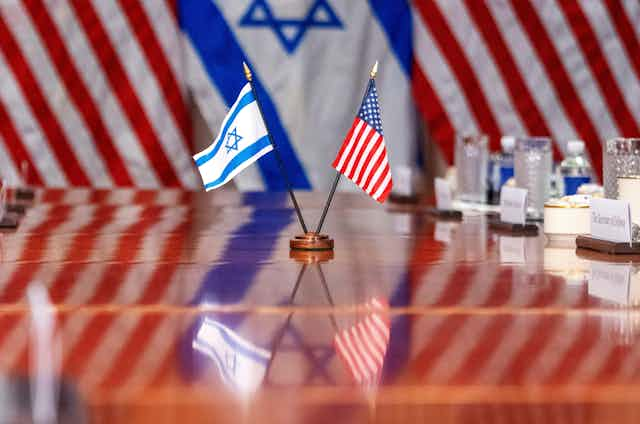Washington’s decision to abstain from voting on a UN security council resolution which calls for a ceasefire and an exchange of hostages with Hamas has angered Israel, which has traditionally counted on the US for unwavering support in international forums. We spoke with John Strawson, a Middle East expert at the University of East London, who has been researching and publishing on the Israeli-Palestinian conflict for several decades.
The United Nations security council has passed a resolution calling for a ceasefire and the return of the hostages held by Hamas. Israeli prime minister Benjamin Netanyahu has indicated that Israel’s military campaign will continue. Does he have the full support of his government in this or is there a risk that any of his more moderate coalition partners will break ranks?
UN security council resolution 2728 is a testimony to ambiguous drafting. It calls for an immediate ceasefire but only to cover the rest of Ramadan, which is only about two weeks. It also seems to link the ceasefire to the return of “all hostages” but is silent as to whether this is a condition for the ceasefire.
It should also be noted that Hamas is not mentioned nor are Israeli hostages. At the conclusion of the relevant paragraph there is a reference to all who are detained – again without reference to their identity. It’s also important to note that Hamas and other Palestinian sources refer to all Palestinian prisoners detained by Israel as “hostages”. As a result there are many possible interpretations of the obligations the resolution seeks to create.
Netanyahu has denounced the US for not vetoing the resolution. Any responsible Israeli leader would have used the ambiguities to say that Israel was already negotiating such a ceasefire and was waiting on Hamas’s reply to their proposals. But Netanyahu’s stance is about keeping his coalition going with the support of the far-right which will enable him to keep his job.
New Hope party leader Gideon Saar has already quit after Netanyahu refused to appoint him to the war cabinet. Obviously this doesn’t bring down the government, but what does it mean in terms of the power dynamic in Israel’s parliament, the Knesset, particularly when it comes to the far-right parties?
Gideon Saar is effectively launching his campaign to be prime minister. He has been a long-term opponent of Netanyahu on the right. He stood for the leadership of Likud, Netanyahu’s party, in 2019. Then in 2021 he broke away and sided in the Knesset with the broad anti-Netanyahu coalition that was able to govern for 12 months before being defeated in November 2022.
Saar wanted to be in the war cabinet where the key decisions are being taken. But the far-right minister of national security, Itamar Ben Gvir, insisted that if Saar was appointed he would need to be as well. But Benny Gantz, one of three voting members of emergency war cabinet had made it a condition that no one from the far-right would be allowed to join.
Netanyahu is not yet ready to break relations with Gantz whose moderate politics plays well with foreign politicians. Saar knows this but wants to position himself to be the next leader of the right when the Netanyahu era is over. In the medium term it just illustrates how febrile Israeli politics are.
Benny Gantz, who is a member of the war cabinet, has threatened to quit over proposed legislation that would exempt ultra-orthodox Jews from being conscripted into the army. The law would also put the government at loggerheads with Israel’s high court. What are the risks for the legitimacy of Netanyahu’s leadership?
It is quite clear that Benny Gantz is trying to break up to the coalition. The ultra-orthodox parties in the ruling coalition really have one aim, which is to maintain the huge government financing of their communities. This is resented by the majority of Israelis especially given their general exemption from military service.
This is particularly stark when Israel is at war and more than 250 soldiers have been killed in action and thousands injured. Gantz knows that the last thing the Israel Defense Forces needs are thousands of reluctant recruits, but he also knows that it is a question of fairness that appeals to the vast majority of Israelis. Gantz is still popular in the polls and undoubtedly sees this issue as a weak spot for Netanyahu’s alliance.

Both the Sephardic and Ashkenazi chief rabbis have said that should the exemption be ended those affected should leave the country. Such statements give Gantz the opportunity of being seen as a patriot and taking the shine off Netanyahu’s nationalist credentials. So Netanyahu faces pressure from the ultra-orthodox, the far right, the more moderate right of Gideon Saar and from Benny Gantz at the centre. But the more these forces circle, the more Netanyahu doubles down on his rhetoric for complete victory over Hamas, seeing the war as his route to political survival.
Netanyahu reacted to the US abstention by cancelling a visit from a high-level Israeli delegation to Washington for talks. But defence minister Yoav Gallant was already in Washington and is reportedly meeting with US officials. How does this affect the Israeli government’s unity?
The Israeli delegation was asked by the Biden administration to discuss in detail the plans for the proposed Rafah operation that Netanyahu has been talking about for weeks. The Americans wanted to know how it could be achieved without causing catastrophic civilian casualities among the 1.2 million people – mostly displaced – sheltering there. But instead of sending military experts, the delegation was headed by the minister for strategic affairs Ron Dermer (a Netanyahu confidant) and Tzachi Henegbi, a former right-wing rabble rouser now serving as national security adviser.
Neither are military experts and Dermer has not even served in the IDF. What they could have told the US military team they were there to brief would be interesting to hear. But these armchair generals will now be staying at home.

Gallant, meanwhile, continues his Washington talks as if nothing has happened. Despite being a member of Likud, Gallant has steered his course especially carefully since March last year when Netanyahu tried but failed to sack him over his opposition to the government’s unpopular judicial reforms, which Gallant said would endanger national security.
Having survived in part due to mass demonstrations in his support, Gallant has occupied a unique position in the cabinet, as someone who stood up to Netanyahu and survived. He is liked in Washington and Netanyahu is probably relieved that he is keeping lines of communication open with the Biden administration. But it’s hard to hide the contrast between Gallant’s meetings and Netanyahu’s pique at Washington’s decision to abstain on the security council vote.
What does this say about the future of US-Israeli relations?
The US has only really seen Israel as strategic ally since the early 1970s. Until then relations had been more problematic. When Israel declared independence in 1948 a US arms embargo was in force. In the 1948 war it was Soviet arms via Czechoslovakia that gave Israel its military advantage.
In the 1950s and 1960s it was mainly France who supplied Israel with arms – including nuclear weapons. The 1956 Suez affair – in which Israel attacked Egypt in coordination with Britain and France – was denounced by the US. But after the six-day war in 1967, the US became more engaged and interestingly has always promoted normalisation between Israel and its Arab neighbours. The 1978 Camp David Accords when Israel and Egypt recognised each other underlined this.
My reading of this is the US entanglement with Israel since the 1970s has been about promoting a particular Middle East order. So we need to understand Israel-US relations in a regional context.
The Biden administration knows you can’t end a war without a peace plan – and that must mean a Palestinian state alongside Israel. The US secretary of state, Antony Blinken, began his recent Middle East visit to Saudi Arabia, seeing Riyadh as central to a stable Middle East. Saudi recognition of Israel comes at the price of concrete steps to a Palestinian state.
The longer Netanyahu resists paying that price the more the agony of Gaza will continue. And all the while the US will have to ratchet up its pressure on the Israeli government.

